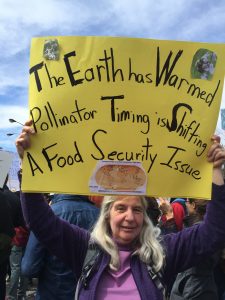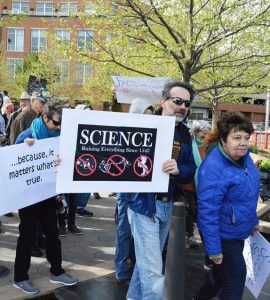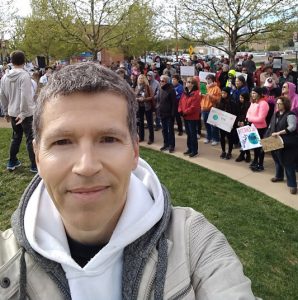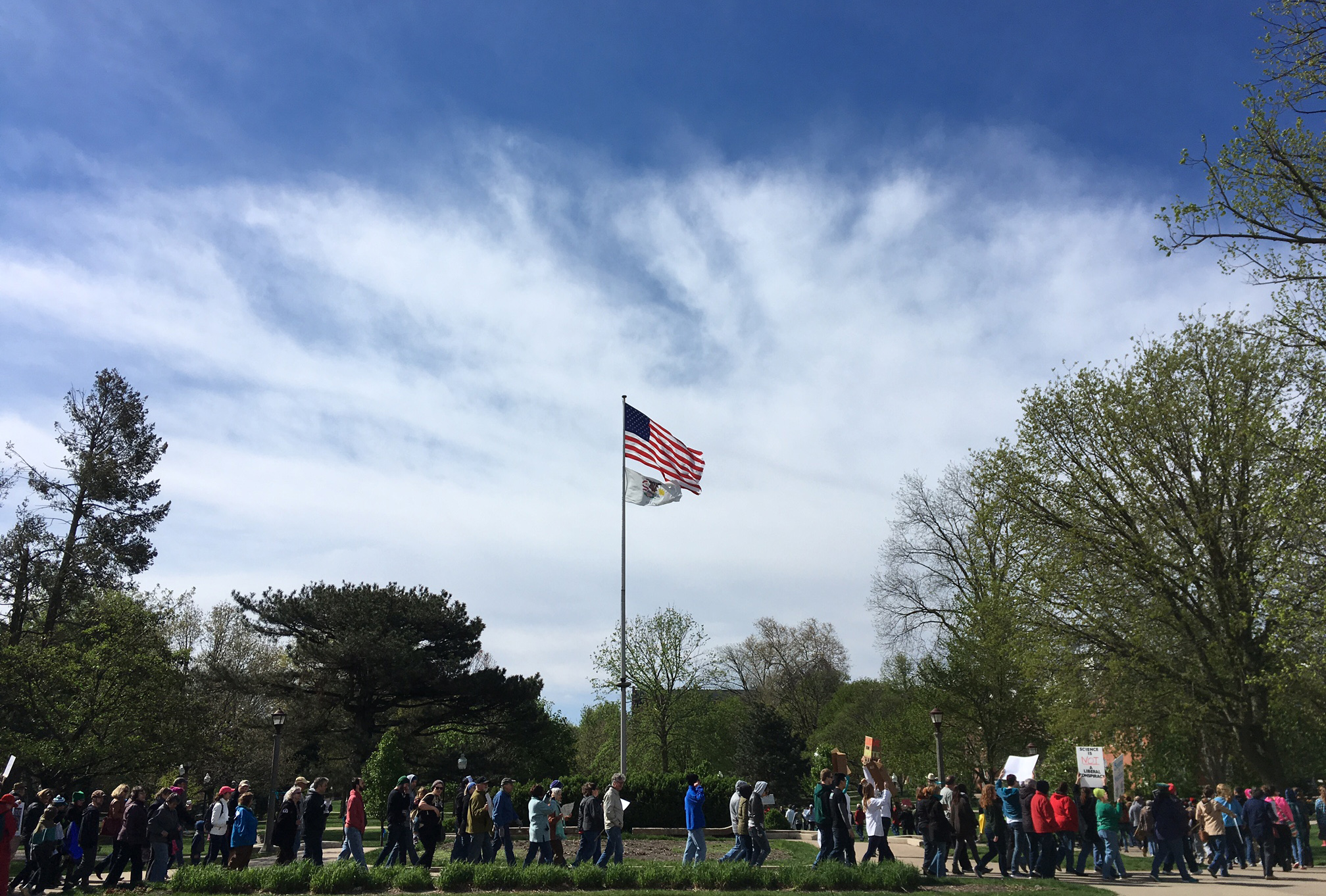Scientists and their supporters gathered around the world Saturday morning for local iterations of the March for Science in response to what they feel is an ongoing assault on science and research funding. Illinois State faculty members and students from across campus attended the March for Science in Normal, which ended on the University’s Quad, and one that attracted more than 40,000 people to downtown Chicago.
“I think the march is drawing attention to the fact we have entered this post-truth era,” said Scott Sakaluk, Distinguished Professor of Zoology at Illinois State. “I think that’s dangerous. I think it’s a situation that calls for the scientific community to collectively voice its concern.”
Marchers also protested large cuts to arts and science funding proposed in President Donald Trump’s budget. Those plans call for an almost 20 percent decrease to the budget of the National Institutes of Health, a major supporter of medical research; the slashing of $9 billion from the U.S. Department of Education; and the elimination of the National Endowments for the Arts and Humanities.
It’s unclear whether these cuts will pass Congress and how they could affect current research efforts. Illinois State researchers have received $1.35 million from the NIH the last two fiscal years. The U.S. Department of Education currently funds 27 projects at Illinois State for a total of nearly $9 million. And this semester, the National Endowment for the Arts gave a $10,000 grant to Obsidian, a journal based at Illinois State that publishes and promotes the work of African artists and scholars of African arts internationally.
Sakaluk said the research funding cuts are not about balancing the federal budget. He thinks they are an attempt by some economic interests to mute science and muzzle scientists. Research funding pays for graduate students’ research stipends and supports laboratories where undergraduate students develop into scientists. “You are not hurting me; I get my salary,” he said. “What you are doing is squeezing the new generation of scientists.”
Redbird Scholar magazine talked to Sakaluk and other professors in Illinois State’s School of Biological Sciences about why they attended the marches:
Diane Byers

Illinois State Professor Diane Byers holds up a sign at the March for Science in Chicago. (Photo courtesy of Diane Byers and Charles Bristow)
Diane Byers, an associate professor of evolutionary biology, attended the Chicago march with her husband, Charles Bristow, an instructional developer in Illinois State’s Center for Teaching, Learning, and Technology. Byers is worried that “gut reaction” is replacing scientific knowledge as the basis for policymaking. “It seems like it has gotten a lot worse.”
Byers is currently working on a paper examining how plant-pollinator interactions are being affected by climate change. She noted how some plants are flowering earlier and at higher elevations, throwing off their relationship with birds, butterflies, and bees. “We are hoping that people will see that we need facts and evidence in developing policy. Or eventually, we will have a food crisis on our hands,” Byers said.
Byers also voiced concern about the federal government defunding data collection efforts. Without this information, scientists cannot study a wide range of topics. “The march shows that scientists are going to become more political.”
Steven Juliano
Steven Juliano, Distinguish Professor of Ecology, marched in the Normal event. “It’s been cast as this is something about the president. It’s sort of true, but it’s much more than that.” He has felt that scientific knowledge has been denied and ignored for a long time by segments of the population.
Juliano noted how some resist the teaching of evolution, deny climate change, and make unsupported claims denouncing vaccinations. “They deny what we see as important facts established by scientists.”

Illinois State Professor Steven Juliano holds a sign at the March for Science in Normal. (Photo by Wolfgang Stein)
Juliano received a $435,000 grant from the NIH last year to fund his research. However, he called funding cuts a symptom of a bigger problem. He hopes policymakers will note the large numbers of people who participated in the marches and see the important advances that scientific knowledge has made possible.
Scott Sakaluk
Scott Sakaluk, Distinguished Professor of Zoology, participated in the Normal march because he is concerned the public is losing confidence in science and the veracity of scientific fact. “I have a genuine concern that I think is important to all of us. This is my modest way of being counted.”
He wants to show the public the real import of science, how it positively affects quality of life, economic development, and many other issues in people’s lives.
“Science is intrinsically the most bipartisan thing you can do,” Sakaluk said, explaining that it is an objective method of gathering information about the world. “At its core, it is the most fundamentally honest process that we can do.”
Wolfgang Stein

Illinois State Professor Wolfgang Stein at the March for Science in Normal (Photo by Wolfgang Stein)
Wolfgang Stein, associate professor of neurophysiology, marched in the Normal event. He said it is important for people to be able to distinguish between alternative facts and those established through the scientific method.
“We need to raise awareness that facts should not be bent to someone’s ideology,” he said. “The current administration in particular makes so many statements that are clearly wrong and go against everything that science does to establish a true fact.”
Stein said public funding for research is on the decline, noting the lack of a budget for universities in Illinois and federal funding cuts. “The funding for science has been troublesome the last few years,” he said.
Stein depends on the support of the National Science Foundation to keep his neuroscience laboratory running. “It is affecting my students on all levels,” he said. “I can live with funding cuts if they are justified, but most of the cuts they are proposing are based on false information or information that is bent to an agenda.”
- The March for Science in Normal began at Uptown Circle. (Photo by Wolfgang Stein)
- Wolfgang Stein speaking at the March for Science in Normal (Photo by Elizabeth Beam)
- Participants brought a variety of signs to March for Science in Normal. (Photo by Elizabeth Beam)
- Attendees of the March for Science in Normal (Photo by Elizabeth Beam)
- Hundreds attended the March for Science in Normal. (Photo by Wolfgang Stein)
- Illinois State School of Biological Sciences Professor Ben Sadd attended the March for Science in Chicago. (Photo by Ben Sadd)
- A group of Redbirds at the March for Science in Chicago (left to right): Molly Schumacher ’11, M.S. ’15; Emma LaMotte ’12; Kristin Duffield, a current Ph.D. biology student; Cristina Almeida; Amanda Wilson Carter, a current Ph.D. biology student; and Ben Sadd, assistant professor of infectious disease ecology (Photo courtesy of Kristin Duffield)
- Sign at the March for Science in Chicago (Photo by Ben Sadd)
- Scene from the March for Science in Chicago (Photo courtesy of Diane Byers and Charles Bristow)
- Illinois State alumnus Randall Hercey ’91, a graduate of the biology teacher education program, at the March for Science in Chicago (Photo by Randall Hercey)
- Scene from the March for Science in Chicago (Photo by Randall Hercey)
Kevin Bersett can be reached at kdberse@IllinoisState.edu.












